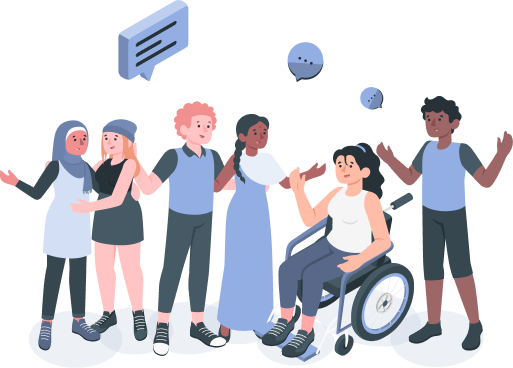Home
Glossary
1/2
Glossary
Your A-Z guide of terms used on this site and in our Draft National Park Partnership Plan 2024-29.
- Affordable housing - Good quality homes that are affordable for people on lower incomes. This can include social rent, mid-market rented, shared-ownership, shared-equity, housing sold at discount (including plots for self-build), self-build plots and low-cost housing without subsidy.
- Biodiversity - The variety of life on earth essential for sustaining the ecosystem that provides us with food, fuel, health, wealth, and other vital services.
- Biodiversity credits - A standard for assigning financial value to biodiversity for financial market trading and investment. Biodiversity credits are similar to carbon credits, which allow investment in projects that capture and store carbon.
- Brownfield - Land which has previously been developed, including vacant and derelict land, land occupied by redundant or unused buildings and developed land.
- Browsing animals - Animals feeding on leaves, soft shoots, or fruits of high-growing, generally woody plants such as trees and shrubs. This is contrasted with grazing, which means animals feeding on grass or other lower vegetations.
- Carbon credits - A carbon credit is a tradable certificate or permit representing the right to emit a set amount of carbon dioxide or the equivalent amount of a different greenhouse gas (tCO2e).
- Carbon negative - Emitting less than zero carbon dioxide and carbon dioxide equity equivalent (CO2e) greenhouse gasses.
- Carbon sequestration - The long-term removal, capture, or storage of carbon dioxide from the atmosphere to slow or reverse atmospheric carbon dioxide (CO2) pollution and to mitigate or reverse climate change.
- Carbon markets - A market system where carbon credits are sold and bought.
- Carbon sink - Anything natural or otherwise, that accumulates and stores some carbon-containing chemical compound for an indefinite period and thereby removes carbon dioxide (CO2) from the atmosphere.
- Climate adaptation/climate change adaptation - Responding to the changes in climate that we have seen over the last few decades whilst preparing for the changes we will face as climate continues to change.
- Climate mitigation/climate change mitigation - Efforts to reduce or prevent greenhouse gas emissions which have an impact on global temperatures and reducing the current concentration of carbon dioxide by enhancing carbon sinks (for example, increasing the area of forest).
- Community climate action hub - A Scottish Government led initiative to support a network of regional community hubs to provide a joined up regional approach to climate change action.
- Community wealth building - A people centred approach to local economic development, that redirects wealth back into the local economy and places control and benefits into the hands of local people.
- Diffuse pollution - The release of potential pollutants from a range of activities that, individually, may have no effect on the water environment, but, at the scale of a catchment, can have a significant effect.
- Designated sites - Areas that are protected for their natural features of special interest and to ensure the features remain in good health for all to enjoy, now and in the future. The designation of sites may be called for by international directives and treaties, domestic legislation and policy, or local needs and interests. Also known as protected areas.
- Ecosystem - An area where plants, animals, and other organisms (living parts), as well as non-living parts (air, soil, water, weather) interact as a system.
- Green jobs - Green jobs include those in renewable energy, the circular economy and zero waste, and the nature-based sector with wider ‘green skills’ sitting on a spectrum ranging from highly specific requirements in sectors directly supporting the transition to net zero such as energy, transport, construction, agriculture, and manufacturing, through to more general requirements across all sectors to thrive in a net zero economy.
- Herbivore pressures - The negative impacts that grazing animals, such as wild deer and livestock can have on trees and other vegetation through eating fresh growth, stripping bark and trampling.
- Just transition - For the Scottish Government a just transition is both the outcome – a fairer, greener future for all – and the process that must be undertaken in partnership with those impacted by the transition to net zero. It supports a net zero and climate resilient economy in a way that delivers fairness and tackles inequality and injustice.
- Mass transit corridor - The movement of people from urban areas using public transport such as buses and trains.
- Montane woodland - Small tree and low shrub species, such as dwarf willow and birch found on higher slopes and rocky outcrops in upland areas.
- Natural capital - The world's stock of natural resources. This includes air, water, minerals, and all living things.
- Nature-positive - Reversing the current declines in nature, so that species and ecosystems begin to recover.
- Natural riparian woodlands - Woodland along rivers and water courses. It serves very important functions in our landscapes, in regulating natural processes and in mitigating extreme events like flooding. Native woodland in the riparian zone is a vital part of the water ecosystem.
- Nature networks - A joined-up system of places important for wild plants and animals, on land and in water. It allows plants, animals, seeds, nutrients and water to move from place to place and enables the natural world to adapt to change, providing plants and animals with places to live, feed and breed. Effectively functioning nature networks will connect existing nature rich areas through habitat corridors, habitat 'stepping stones', or habitat restoration areas.
- Net Zero - The balance between the amount of greenhouse gas produced and the amount removed from the atmosphere. We reach net zero when the amount we add is no more that the amount taken away.
- Net Zero Nation - A nation in which the amount of greenhouse gas emissions put into the atmosphere is balanced by the amount taken out by sequestration - resulting in net zero emissions.
- Peatland/s - Land defined by peat soil or peaty soil types. This means that 'peat-forming' vegetation is growing and actively forming peat, or it has been grown and has formed peat at some point in the past.
- Site of Special Scientific Intertest (SSSI) - A type of designated site (see description of designated site above). Areas of land and water that are designated as they best represent Scotland's natural heritage.
- Special Areas of Conservation - A type of designated site (see description of designated site above). Areas of land and water that are designated to protects one or more special habitats and/or species listed in the Habitats Directive.
- Sustainable - Meeting the needs of the present generation without compromising the needs of future generations.
- Third sector - The third sector includes charities, social enterprises and voluntary groups, delivers essential services, helps to improve people's wellbeing and contributes to economic growth. It plays a vital role in supporting communities at local level.
This engagement phase has finished

...
